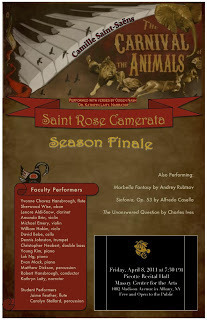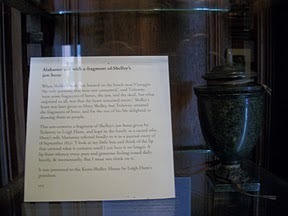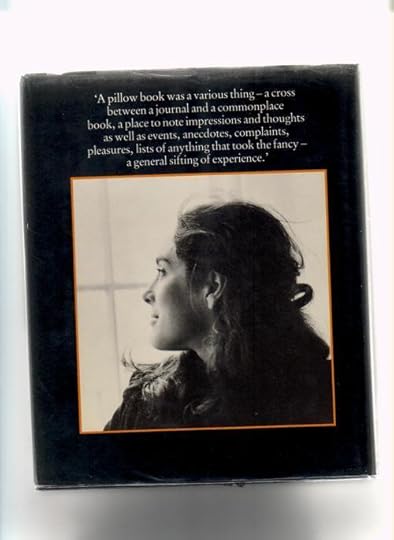K.A. Laity's Blog, page 153
April 12, 2011
April Fools Broad Pod
Okay, well not so much April fools as April fun! The April Broad Pod is up -- that's the podcast from Broad Universe, the organization that supports women in speculative fiction and has a wealth of fabulous people including me! Go on, give it a listen.
[image error]
Today I'm participating in a talk on "The Glass Ceiling" on campus, put together by the young go-getters of the Women's Initiative. Then I'm running down to Kingston for another play reading at the Arts Society of Kingston. It will give me a chance to chat more with the folks there about my own reading of Lumottu , which will be on May 31st (save the date!).
It's Tuesday, so don't forget to check out this week's Overlooked A/V over at Todd's blog.
Rush, rush, rush! The theme of the week. Here's my first word cloud for the talk: still tweaking to do.


[image error]
Today I'm participating in a talk on "The Glass Ceiling" on campus, put together by the young go-getters of the Women's Initiative. Then I'm running down to Kingston for another play reading at the Arts Society of Kingston. It will give me a chance to chat more with the folks there about my own reading of Lumottu , which will be on May 31st (save the date!).
It's Tuesday, so don't forget to check out this week's Overlooked A/V over at Todd's blog.
Rush, rush, rush! The theme of the week. Here's my first word cloud for the talk: still tweaking to do.

Published on April 12, 2011 06:05
April 10, 2011
Carnival of the Animals
[image error]
Image via Sokoblovsky Farms, petitelapgiraffe.com
The CSR Camerata concert went very well (not just saying that; read the review :-). I had a lot of fun reading Nash's poems and listening to my fabulous colleagues play. We all went out to The Point afterward, which is always lovely, too. I am consequently brainstorming more ways to combine the written word and music. Who wouldn't want to add beautiful music to an academic presentation? Wonderful.
A hectic week ahead which culminates in leaving Friday for Iowa to give the keynote speech at the Craft/Critique/Culture Conference. Let's hope by the time I get on that plane I am happy with the talk and the Powerpoint presentation, so I can relax and read something fun rather than continue tinkering with it all.
Not there yet. Argh -- at least not Sunday afternoon as I type this, though perhaps Monday morning when it posts was supposed to post [d'oh!]. Because I've got events all day Monday, Tuesday and Thursday, so there's precious little time left.
Gulp.
Image via Sokoblovsky Farms, petitelapgiraffe.com
The CSR Camerata concert went very well (not just saying that; read the review :-). I had a lot of fun reading Nash's poems and listening to my fabulous colleagues play. We all went out to The Point afterward, which is always lovely, too. I am consequently brainstorming more ways to combine the written word and music. Who wouldn't want to add beautiful music to an academic presentation? Wonderful.
A hectic week ahead which culminates in leaving Friday for Iowa to give the keynote speech at the Craft/Critique/Culture Conference. Let's hope by the time I get on that plane I am happy with the talk and the Powerpoint presentation, so I can relax and read something fun rather than continue tinkering with it all.
Not there yet. Argh -- at least not Sunday afternoon as I type this, though perhaps Monday morning when it posts was supposed to post [d'oh!]. Because I've got events all day Monday, Tuesday and Thursday, so there's precious little time left.
Gulp.
Published on April 10, 2011 16:28
April 8, 2011
Carnival & FFB: Skeem Life
 Tonight! The Saint Rose Camerata plays Camille Saint-Saëns' Carnival of the Animals. I will read some Ogden Nash poems between the songs. Unfortunately not among them is one of the tiny number of poems I can recite by heart (which includes Lewis Carroll's Jabberwocky and Dorothy Parker's Résumé):
Tonight! The Saint Rose Camerata plays Camille Saint-Saëns' Carnival of the Animals. I will read some Ogden Nash poems between the songs. Unfortunately not among them is one of the tiny number of poems I can recite by heart (which includes Lewis Carroll's Jabberwocky and Dorothy Parker's Résumé):The wombat lives across the seas
Among the far Antipodes.
He may exist on nuts and berries
Or then again, on missionaries.
His distant habitat precludes
Conclusive knowledge of his moods,
But I would not engage the wombat
In any form of mortal combat.
Wise words!
Get the full round up of Friday's Forgotten Books over at Patti Abbot's blog. I'm stretching the definition of FFB to cover a book that hasn't had much exposure and should: SKEEM LIFE by Gary Robertson. I met Gary on Twitter, first because of his band The Cundeez -- probably because I was touting the Punk Rock Juke Box with Marko (every Thu 12-3 and Fri 11-2 Eastern). Good stuff! As we got to talking, we discovered we both wrote and chatted about plays and books. Gary sent me a lovely package with Skeem Life and his book of poetry, Pure Dundee, and his historical study Gangs of Dundee. You're sensing a theme, eh? He also sent me The Cundeez CDs and a DVD of a performance of his play The Berries.
Well, you know that I'm usually quite good with languages and accents, but I have to admit while I had little trouble reading Dundeez, I have had to listen very closely while watching the play! I'm going to have to watch it again after reading and assimilating the books, but it's a very funny and often rather touching account of a day's work picking berries. Apparently buses would take people out from the city to pick berries during the height of the season, a welcome addition to their often meagre incomes during the tough times, but also a kind of break from the usual routine.
As Robertson puts it in "McGonagall's Disciples" (a reference to the legendary Scottish poet),
We are thi Dundee lihterahti
Ejicated on thi streetz an a but bren scatty
and they speak
Wi language az rough az a rhino's erse
Oary Dundonian in poetic verse
Itz oor tongue, oor dialect, itz how wi converse
You get acclimated quickly. And the stories in Skeem Life are often hilarious though also often relating dangerous events and somewhat scandalous situations, but the matter of fact spirit and unflagging sense of fun triumph. It's a hard life, but there's never any self-pity. Great stuff.
Check out the music, poetry and books, and be sure to keep it oary!
Published on April 08, 2011 06:05
April 7, 2011
Epiphanies and Inspiration
No column today: I'm not writing any this month as I'm just too swamped. Tonight's the dress rehearsal for the Camerata's production of Saint-Saëns' Carnival of the Animals with me as narrator. Do join us tomorrow night for the performance if you can at 7:30 in the Picotte Recital Hall of the Massry Center. It will be lovely -- we have some amazing performers.

From Rome
I had a little epiphany this morning: Modern publishing is like science, extracting genre from organic story like chemicals from herbs. The best stories straddle genre. I already knew the falseness of marketing to strict genres; what I hadn't realised was its similarity to how medical science has sought to isolate the "effective" chemical and extract it from the plant. What they've been discovering of course is that all the seemingly extraneous elements play important roles in absorption and so forth.
Over at UAlbany they had John Patrick Shanley visiting. I went to the afternoon seminar, as always hoping to hear something that will kick my brain back into high gear. I loved his story about how Cyrano de Bergerac inspired him as young teen in the Bronx, being both tough, smart and a freak -- and getting all his friends pastries with just the power of his words. "That's what I do." He has a very direct (and funny) way of talking, as befits an ex-Marine from a rough part of New York. You can see it when he mentions telling a critique partner in exasperation, "I don't know why you're alive," because his script was full of "lies" and bad writing. But he also says how much he hungers to have the ultimate romantic connection. A lot easier for an ex-Marine to say that and be taken seriously, but you see within the snappy patter the guy who wrote Moonstruck. The image that gave birth to that film was his mother's face and the sky that he saw as a child and then she was gone and what was in the sky? The moon.
He got a little impatient with one guy who seemed to want to pump him for the secrets to success and repeated exactly what I have always believed: writing has shamanic power. You're not writing for yourself, you're writing for your tribe (and sometimes, to find your tribe). All I need, he said, is a torch in the dark telling my stories before a circle of people. "The problem with a lot of bad writing is all the subtext, I'm sick of subtext." People speak less when they tell the truth, Shanley said, because it always costs them something.
Things to keep in mind as I keep working on the talk. Trying not to think about Lucky Jim too much. Be truthful. Offer something real. Tell my tribe what I know.

From Rome
I had a little epiphany this morning: Modern publishing is like science, extracting genre from organic story like chemicals from herbs. The best stories straddle genre. I already knew the falseness of marketing to strict genres; what I hadn't realised was its similarity to how medical science has sought to isolate the "effective" chemical and extract it from the plant. What they've been discovering of course is that all the seemingly extraneous elements play important roles in absorption and so forth.
Over at UAlbany they had John Patrick Shanley visiting. I went to the afternoon seminar, as always hoping to hear something that will kick my brain back into high gear. I loved his story about how Cyrano de Bergerac inspired him as young teen in the Bronx, being both tough, smart and a freak -- and getting all his friends pastries with just the power of his words. "That's what I do." He has a very direct (and funny) way of talking, as befits an ex-Marine from a rough part of New York. You can see it when he mentions telling a critique partner in exasperation, "I don't know why you're alive," because his script was full of "lies" and bad writing. But he also says how much he hungers to have the ultimate romantic connection. A lot easier for an ex-Marine to say that and be taken seriously, but you see within the snappy patter the guy who wrote Moonstruck. The image that gave birth to that film was his mother's face and the sky that he saw as a child and then she was gone and what was in the sky? The moon.
He got a little impatient with one guy who seemed to want to pump him for the secrets to success and repeated exactly what I have always believed: writing has shamanic power. You're not writing for yourself, you're writing for your tribe (and sometimes, to find your tribe). All I need, he said, is a torch in the dark telling my stories before a circle of people. "The problem with a lot of bad writing is all the subtext, I'm sick of subtext." People speak less when they tell the truth, Shanley said, because it always costs them something.
Things to keep in mind as I keep working on the talk. Trying not to think about Lucky Jim too much. Be truthful. Offer something real. Tell my tribe what I know.
Published on April 07, 2011 08:22
April 6, 2011
The Little Video of Calm
In the midst of the mad swirl of our lives, we all need a little moment of calm. Lacking
The Little Book of Calm
, I try to conjure up soothing images of relaxing situations. Because I love mudlarking along the Thames, I took this video to remind me of those moments of calm.
Of course sometimes I try to relieve stress by simply doing very silly things. Recently YouTube introduced new programs where you can make animation of whatever you like. Yes, if this sounds rather like the video I made for the Women's League of Ale Drinkers, well, it is very much like that. In an idle moment, I decided to animate the lyrics to The Fall's "Dice Man" [based on the cult novel and NOT that crap 'comedian'] and it looks like this:
Silly: but sometimes that's just what you need, right? Well, sure -- some people write poetry -- but I seem to only be able to write asinine poetry. In the meanwhile, I find there is so little time, so much to do.
Of course sometimes I try to relieve stress by simply doing very silly things. Recently YouTube introduced new programs where you can make animation of whatever you like. Yes, if this sounds rather like the video I made for the Women's League of Ale Drinkers, well, it is very much like that. In an idle moment, I decided to animate the lyrics to The Fall's "Dice Man" [based on the cult novel and NOT that crap 'comedian'] and it looks like this:
Silly: but sometimes that's just what you need, right? Well, sure -- some people write poetry -- but I seem to only be able to write asinine poetry. In the meanwhile, I find there is so little time, so much to do.
Published on April 06, 2011 05:30
April 5, 2011
Review: Vision: From the Life of Hildegard of Bingen
See all of Tuesday's Overlooked Films (and other media) over at Todd Mason's blog.

There's a short BBC film on the life of Hildegard von Bingen that I show to my classes starring the fantastic Patricia Routledge as the visionary healer. Despite its creaky low-budget ambience I prefer it to this one despite its beauties. But I'm all for more films (and plays and books) about one of the many influential women of the Middle Ages. Despite what my students have sometimes told me, there are not only women in medieval times (yes, I have had students say that "there were no women in Anglo-Saxon England" which makes one wonder how there were any men...) but a surprising number were well known at the time not just in retrospect.
Hildegard is one and this film conveys some of the reasons why. Her visions hold center stage here, which is a shame because her music should share that stage. The music is there, but it's as if filmmaker Margarethe von Trotta assumes you already know about the music from the start. Eventually -- and rather gloriously -- the music gets it moment, embodied in a very pagan-looking production of the Ordo Virtutum which releases the nuns from their habits and wimples to look absolutely golden with grace.
But a lot of the film seems unable to see Hildegard's piety except from an anachronistic modernity. There's the gruesome revelation of her spiritual mother's cilice upon her death, where the metal prongs have to be peeled away from her rotting flesh. Hildegard's combativeness against the masculine discipline seems to be the simple misogyny of individuals rather than the more complicated hierarchical world that evolves from a patriarchal structure; after all, Hildegard proves able to negotiate that imposing edifice with skill and insight, circumventing control with targeted appeals to the right ears. The importance of an authoritative endorsement of her work at the Synod of Trier and her correspondence with popes and leaders demonstrates the significant power this "humble vessel" attained.
Of course modern filmmakers can only see the relationships between the women, especially Hildegard's connection to her acolyte Richardis, as a barely concealed sexual attraction, which trivialises the depth and complexity of the lives of women in cloistered world. Hildegard's faith gave her authority and power; it infused her life and her outlook. The visions -- which von Trotta's film suggests are as often put on for show as for genuine insight -- were amazingly complex works that crystalised complex notions into a single multifaceted image. She turned a medical condition that plagued her into a gift that allowed her to interpret and explain in an unprecedented way: true genius.
Nonetheless, there is much to enjoy in the film. Barbara Sukowa makes an arresting Hildegard and the film provides a gorgeous view of medieval life that isn't all leeches and mud. The gardens in particular are lovely: Hildegard as a healer (and the author of Physica and Causae et Curae) also gets short shrift in the film, though we do see her teaching the novices herbs. The film has a leisurely pace, so don't go expecting action/adventure. A good introduction for folks who know nothing about this remarkable woman: with luck, it will inspire you to look further.

There's a short BBC film on the life of Hildegard von Bingen that I show to my classes starring the fantastic Patricia Routledge as the visionary healer. Despite its creaky low-budget ambience I prefer it to this one despite its beauties. But I'm all for more films (and plays and books) about one of the many influential women of the Middle Ages. Despite what my students have sometimes told me, there are not only women in medieval times (yes, I have had students say that "there were no women in Anglo-Saxon England" which makes one wonder how there were any men...) but a surprising number were well known at the time not just in retrospect.
Hildegard is one and this film conveys some of the reasons why. Her visions hold center stage here, which is a shame because her music should share that stage. The music is there, but it's as if filmmaker Margarethe von Trotta assumes you already know about the music from the start. Eventually -- and rather gloriously -- the music gets it moment, embodied in a very pagan-looking production of the Ordo Virtutum which releases the nuns from their habits and wimples to look absolutely golden with grace.
But a lot of the film seems unable to see Hildegard's piety except from an anachronistic modernity. There's the gruesome revelation of her spiritual mother's cilice upon her death, where the metal prongs have to be peeled away from her rotting flesh. Hildegard's combativeness against the masculine discipline seems to be the simple misogyny of individuals rather than the more complicated hierarchical world that evolves from a patriarchal structure; after all, Hildegard proves able to negotiate that imposing edifice with skill and insight, circumventing control with targeted appeals to the right ears. The importance of an authoritative endorsement of her work at the Synod of Trier and her correspondence with popes and leaders demonstrates the significant power this "humble vessel" attained.
Of course modern filmmakers can only see the relationships between the women, especially Hildegard's connection to her acolyte Richardis, as a barely concealed sexual attraction, which trivialises the depth and complexity of the lives of women in cloistered world. Hildegard's faith gave her authority and power; it infused her life and her outlook. The visions -- which von Trotta's film suggests are as often put on for show as for genuine insight -- were amazingly complex works that crystalised complex notions into a single multifaceted image. She turned a medical condition that plagued her into a gift that allowed her to interpret and explain in an unprecedented way: true genius.
Nonetheless, there is much to enjoy in the film. Barbara Sukowa makes an arresting Hildegard and the film provides a gorgeous view of medieval life that isn't all leeches and mud. The gardens in particular are lovely: Hildegard as a healer (and the author of Physica and Causae et Curae) also gets short shrift in the film, though we do see her teaching the novices herbs. The film has a leisurely pace, so don't go expecting action/adventure. A good introduction for folks who know nothing about this remarkable woman: with luck, it will inspire you to look further.
Published on April 05, 2011 08:45
April 4, 2011
Handling Rejection
[I wrote this for another site, but I think it's worth reprinting here.]
This is not a book that should be tossed lightly aside.
It should be hurled with great force.
– Dorothy Parker

From Rome
I write for BitchBuzz, the global women's lifestyle network and my column for this week dealt with — among other things — the most spectacular writer meltdown in some time. You may have heard of or even participated in the Greek Seaman Incident as I like to call it (who can resist that name?). I liked Sally Quillford's take on the whole situation and how — bad as the author behaved — the need to pile on her after the point was made showed the worst in humans and especially writers and wannabe writers.
The truth is we all have to deal with rejection and the way you do that tells the world a lot about what kind of person you are — and tells publishers, editors and agents what kind of person you are to work with. It's a rare person who can take criticism without some bitterness. Throughout the ages writers have taken exception to those who found their work wanting:
What a blessed thing it is that nature, when she invented, manufactured and patented her authors, contrived to make critics out of the chips that were left! — Oliver Wendell Holmes
Writing is an occupation in which you have to keep proving your talent to those who have none. — Jules Renard
There is probably no hell for authors in the next world – they suffer so much from critics and publishers in this. — C. N. Bovee
You need to be able to take criticism in stride. That can be especially hard for new writers and particularly for women because we are taught to seek approval and often take it to heart when someone coldly rejects the manuscript we've been working on for days, months or years. Fear of rejection keeps far too many authors from getting their words out where they belong. I know — I used to be one of them. I'd write and write and write — and put it all in a drawer.
Coward.
Like everything else in life, the more you do it, the easier it gets. Bradbury rule: start something, finish it, send it off, start something else. When the story comes back with a rejection, send it somewhere else and keep writing! You have to learn to take rejection not as an indication of personal failing but as a wrong address. Think of these wise words:
This manuscript of yours that has just come back from another editor is a precious package. Don't consider it rejected. Consider that you've addressed it 'to the editor who can appreciate my work' and it has simply come back stamped 'Not at this address'. Just keep looking for the right address. — Barbara Kingsolver
And rejection doesn't end with publication. No matter how well you write, you will get critics who do not like your work. Sometimes they will teach you useful things about your writing. Sometimes it will simply be a matter of taste. You can't always know the difference. Save your snark for your friends; don't complain on the 'net because the world is watching.
I decided some time ago that while I could be Elizabeth Bennet in private, I needed to be Jane in public. Be gracious in your dealings with people especially when they don't deserve it. You will impress everyone (though I can't guarantee you a Bingley). And just get on with your writing. That's what you need to do.
Pay no attention to what the critics say; no statue has ever been erected to a critic. – Jean Sibelius
[Why am I scrambling this Monday morning? Because I ran off yesterday to have lunch in NoHo with the QoE and May -- totally worth it :-)]


This is not a book that should be tossed lightly aside.
It should be hurled with great force.
– Dorothy Parker

From Rome
I write for BitchBuzz, the global women's lifestyle network and my column for this week dealt with — among other things — the most spectacular writer meltdown in some time. You may have heard of or even participated in the Greek Seaman Incident as I like to call it (who can resist that name?). I liked Sally Quillford's take on the whole situation and how — bad as the author behaved — the need to pile on her after the point was made showed the worst in humans and especially writers and wannabe writers.
The truth is we all have to deal with rejection and the way you do that tells the world a lot about what kind of person you are — and tells publishers, editors and agents what kind of person you are to work with. It's a rare person who can take criticism without some bitterness. Throughout the ages writers have taken exception to those who found their work wanting:
What a blessed thing it is that nature, when she invented, manufactured and patented her authors, contrived to make critics out of the chips that were left! — Oliver Wendell Holmes
Writing is an occupation in which you have to keep proving your talent to those who have none. — Jules Renard
There is probably no hell for authors in the next world – they suffer so much from critics and publishers in this. — C. N. Bovee
You need to be able to take criticism in stride. That can be especially hard for new writers and particularly for women because we are taught to seek approval and often take it to heart when someone coldly rejects the manuscript we've been working on for days, months or years. Fear of rejection keeps far too many authors from getting their words out where they belong. I know — I used to be one of them. I'd write and write and write — and put it all in a drawer.
Coward.
Like everything else in life, the more you do it, the easier it gets. Bradbury rule: start something, finish it, send it off, start something else. When the story comes back with a rejection, send it somewhere else and keep writing! You have to learn to take rejection not as an indication of personal failing but as a wrong address. Think of these wise words:
This manuscript of yours that has just come back from another editor is a precious package. Don't consider it rejected. Consider that you've addressed it 'to the editor who can appreciate my work' and it has simply come back stamped 'Not at this address'. Just keep looking for the right address. — Barbara Kingsolver
And rejection doesn't end with publication. No matter how well you write, you will get critics who do not like your work. Sometimes they will teach you useful things about your writing. Sometimes it will simply be a matter of taste. You can't always know the difference. Save your snark for your friends; don't complain on the 'net because the world is watching.
I decided some time ago that while I could be Elizabeth Bennet in private, I needed to be Jane in public. Be gracious in your dealings with people especially when they don't deserve it. You will impress everyone (though I can't guarantee you a Bingley). And just get on with your writing. That's what you need to do.
Pay no attention to what the critics say; no statue has ever been erected to a critic. – Jean Sibelius
[Why am I scrambling this Monday morning? Because I ran off yesterday to have lunch in NoHo with the QoE and May -- totally worth it :-)]

Published on April 04, 2011 05:38
April 2, 2011
BitchBuzz: Exploding on the Internet
So, yeah -- it's a bit late. The column I usually send in on Wednesday to appear on Thursday was there, unsent, Thursday late. I would say I can't believe I did that, but it's all too believable with the hectic way things are. I take it as a reminder to slow down and pay attention. Never a bad idea.
Rebecca Black, Fame, & Exploding in PublicBy K.A. Laity
 "Fame is a bee. / It has a song / It has a sting / Ah, too, it has a wing." - Emily Dickinson
"Fame is a bee. / It has a song / It has a sting / Ah, too, it has a wing." - Emily Dickinson
There have been a couple of instructive internet memes this past week: Rebecca Black and The Greek Seaman. The former is a 13-year-old with well-to-do parents who paid for a professionally recorded music video, the latter a novice writer who attacked a reviewer who did not like her book. The two are seemingly unrelated but for the internet sensation they became, but if we dig a little further we will find some unsettling parallels.
You may count yourself lucky if you didn't get a friend on Facebook linking to "The Worst Music Video Ever" and asking for you to watch it and agree. First, it's not the worst ever (there is so much competition, but a rough internet agreement seems to have settled on Armi &Danni's "I Wanna Love you Tender"). Further, it's surely not any more (or less) annoying that Justin Bieber or a host of other teen sensations. I quizzed my students on why they thought Black was so much worse than any other but they simply shrugged and put it down to fatigue with Autotuned pop music. A valid point, but I think that's a tipping point we reached some time ago...
Read the rest at BBHQ.
Rebecca Black, Fame, & Exploding in PublicBy K.A. Laity
 "Fame is a bee. / It has a song / It has a sting / Ah, too, it has a wing." - Emily Dickinson
"Fame is a bee. / It has a song / It has a sting / Ah, too, it has a wing." - Emily Dickinson
There have been a couple of instructive internet memes this past week: Rebecca Black and The Greek Seaman. The former is a 13-year-old with well-to-do parents who paid for a professionally recorded music video, the latter a novice writer who attacked a reviewer who did not like her book. The two are seemingly unrelated but for the internet sensation they became, but if we dig a little further we will find some unsettling parallels.
You may count yourself lucky if you didn't get a friend on Facebook linking to "The Worst Music Video Ever" and asking for you to watch it and agree. First, it's not the worst ever (there is so much competition, but a rough internet agreement seems to have settled on Armi &Danni's "I Wanna Love you Tender"). Further, it's surely not any more (or less) annoying that Justin Bieber or a host of other teen sensations. I quizzed my students on why they thought Black was so much worse than any other but they simply shrugged and put it down to fatigue with Autotuned pop music. A valid point, but I think that's a tipping point we reached some time ago...
Read the rest at BBHQ.
Published on April 02, 2011 04:07
April 1, 2011
Friday's Forgotten Books: The Pillow Book of Eleanor Bron
I'm glad to put the March madness behind me, but as it's April Fools' Day, I'll not trust that things are any less insane. No column yesterday because as I discovered last night, I forgot to send it -- d'oh! Maybe it'll be up later today. That's just how it's been. Some of the madness is good: keep your fingers crossed.
Publication: Check out my faux Lear in the April issue of Asinine Poetry and "like" it if so inclined. See also my "hack" bio. The editor writes:
Ms. K.A. Laity is capable as few poets are of a nubile, incessant verse that wears its pants lightly. Her poetics do not hold to some center, but instead bounce around the space in a vain effort to catch the laser point of reason.
High praise, eh -- er, something...
Don't forget to peruse the other offerings of overlooked books at Patti Abbott's blog.
 FFB: THE PILLOW BOOK OF ELEANOR BRON
FFB: THE PILLOW BOOK OF ELEANOR BRON
First, massive thanks to Todd for getting me this. We had nearly given up on it arriving and then at last it did. It's a hard to find book, which is a travesty. You doubtless know Bron if only from my mentions of her with my idol Peter Cook or in the Beatles' Help! or of course as Patsy's mother in AbFab.
What you may not know is that she is a crisply intelligent observer and witty self-deflating writer. Working with lionized men like Cook, Moore, Miller and Bennett in Beyond the Fringe and of course, The Beatles, Bron often finds herself on the fringes of the excitement and ignored. Yet she never seems resentful although frequently amused and always sharply observant. Here she is on flying to Nassau with the Fab Four to film the tropical sections of Help!:
I was not prepared for the noise when we walked out onto the tarmac. It was Trafalgar Square with the volume up, beyond imagination -- the sound of millions of starlings startled into the air, But the starlings were girls, when I looked back, very very young ones, who covered the airport buildings. Wherever you could see, wherever they could see, wherever they were allowed, and elsewhere, oozing and easing themselves in where they were not; waving banners and arms, pushing and heaving, in great danger I imagine of falling over edges, wriggling and ceaselessly squealing -- a high sighing hopeless poignant sound, unrequitable.
She reprints a letter from EM Forster who says he's looking forward to seeing her in the dramatic adaptation of Howard's End. Bron makes little lists, "poignant things" or "disappointing things" or "remarkable things":
-- my mother's total lack of vanity
-- my father's sense of fairness
The glamourous world of show business, which she seems nonplussed to find herself immersed in, gets treated with an explorer's eye of discovery and sometimes a dazzled look of amazement. The whole of this book is delightful and I long to sit down to tea with Bron and just talk for hours. Sigh.
Publication: Check out my faux Lear in the April issue of Asinine Poetry and "like" it if so inclined. See also my "hack" bio. The editor writes:
Ms. K.A. Laity is capable as few poets are of a nubile, incessant verse that wears its pants lightly. Her poetics do not hold to some center, but instead bounce around the space in a vain effort to catch the laser point of reason.
High praise, eh -- er, something...
Don't forget to peruse the other offerings of overlooked books at Patti Abbott's blog.
 FFB: THE PILLOW BOOK OF ELEANOR BRON
FFB: THE PILLOW BOOK OF ELEANOR BRONFirst, massive thanks to Todd for getting me this. We had nearly given up on it arriving and then at last it did. It's a hard to find book, which is a travesty. You doubtless know Bron if only from my mentions of her with my idol Peter Cook or in the Beatles' Help! or of course as Patsy's mother in AbFab.
What you may not know is that she is a crisply intelligent observer and witty self-deflating writer. Working with lionized men like Cook, Moore, Miller and Bennett in Beyond the Fringe and of course, The Beatles, Bron often finds herself on the fringes of the excitement and ignored. Yet she never seems resentful although frequently amused and always sharply observant. Here she is on flying to Nassau with the Fab Four to film the tropical sections of Help!:
I was not prepared for the noise when we walked out onto the tarmac. It was Trafalgar Square with the volume up, beyond imagination -- the sound of millions of starlings startled into the air, But the starlings were girls, when I looked back, very very young ones, who covered the airport buildings. Wherever you could see, wherever they could see, wherever they were allowed, and elsewhere, oozing and easing themselves in where they were not; waving banners and arms, pushing and heaving, in great danger I imagine of falling over edges, wriggling and ceaselessly squealing -- a high sighing hopeless poignant sound, unrequitable.
She reprints a letter from EM Forster who says he's looking forward to seeing her in the dramatic adaptation of Howard's End. Bron makes little lists, "poignant things" or "disappointing things" or "remarkable things":
-- my mother's total lack of vanity
-- my father's sense of fairness
The glamourous world of show business, which she seems nonplussed to find herself immersed in, gets treated with an explorer's eye of discovery and sometimes a dazzled look of amazement. The whole of this book is delightful and I long to sit down to tea with Bron and just talk for hours. Sigh.
Published on April 01, 2011 07:03
March 30, 2011
Reading: Lumottu
I am very pleased to announce that my play Lumottu will receive a fully cast reading at the Arts Society of Kingston on May 31st. Casting will commence soon. As they make clear on the website, "These are workshops rather than productions, whose focus is on process, not product. It is the hope of the Lab that playwrights will listen to all feedback without defending or explaining their work, then sift through the feedback at their leisure. In the end, only the playwright can decide what feedback to use or lose."
The name of the play is the Finnish word for "enchanted" and it explores the power of myth for people in difficult situations. Here's the description they're using for mailings:
Arja lives with one foot in this world and the other in the mythic world of ancient Finland. Her family has moved to the new world, but the old world's magic clings to their lives — and deaths.
Sound intriguing? I hope so. This play first jumped from my head Athena-like when I was on the boat in Lake Saimaa heading out to see the ancient rock paintings. I saw it as a performance: a woman dressed as Louhi with her eagle wings behind a girl who was telling the story. It's wonderful to have this one step closer to realising that image.

The name of the play is the Finnish word for "enchanted" and it explores the power of myth for people in difficult situations. Here's the description they're using for mailings:
Arja lives with one foot in this world and the other in the mythic world of ancient Finland. Her family has moved to the new world, but the old world's magic clings to their lives — and deaths.
Sound intriguing? I hope so. This play first jumped from my head Athena-like when I was on the boat in Lake Saimaa heading out to see the ancient rock paintings. I saw it as a performance: a woman dressed as Louhi with her eagle wings behind a girl who was telling the story. It's wonderful to have this one step closer to realising that image.
Published on March 30, 2011 06:20



